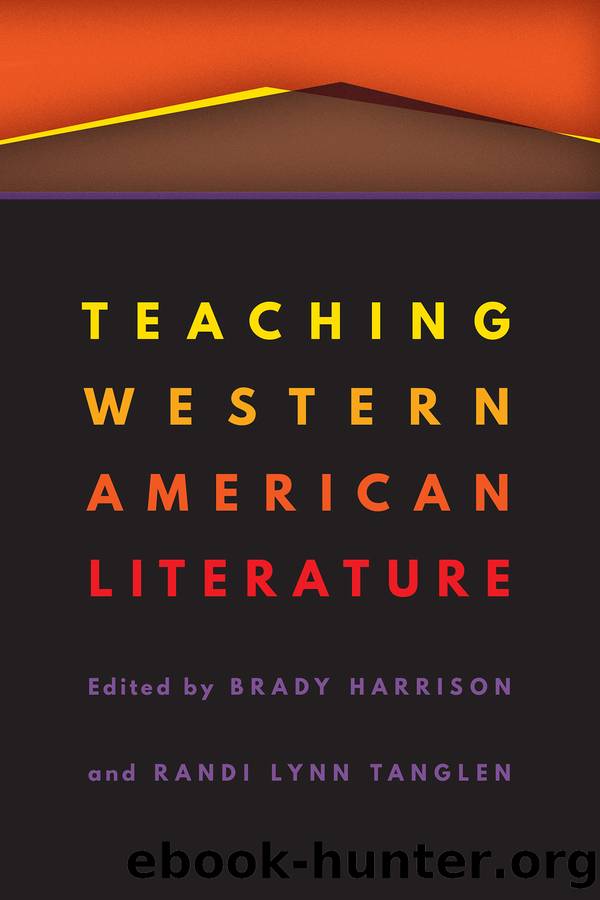Teaching Western American Literature by Unknown

Author:Unknown
Language: eng
Format: epub
Tags: LCO002000 Literary Collections / American / General, EDU025000 Education / Secondary
Publisher: University of Nebraska Press
A focus on western American texts offers opportunities to make connections rather than cordon off this literature in a regional ghetto. Conversely, as Kowalewski has observed, âwhen certain works of western literature are taken seriously in the academy, they tend to be thought of in nonregional terms; they tend to be legitimized under the aegis of, say Chicano Studies, Native American Studies, or, more broadly, Environmental Studies.â6 What might we discover in some of these books that are best known in area studies if we reterritorialized them, put them back in place? What new readings might we find for James Welchâs Winter in the Blood, with its careful distinctions between towns on Montanaâs Hi-Line? If we attend to the kinds of work the characters do or donât do, or what they eat? What if we think regionally about Jeanne Wakatsuki Houstonâs Farewell to Manzanar, with its careful attention to the different public school communities within Californiaâs cities? Below I will sketch the course, how the readings and assignments bring place and the everyday together, offering students some strategies for recognizing, analyzing, and producing texts that engage what it can mean to inhabit a place. With an emphasis on the work of Ben Highmoreâs everyday and Kathleen Stewartâs concepts of ordinary affects and regionality, we have the tools to âdisplace and flatten hierarchies between the big (important) and small (off-register, invisible) or between notions of an official system in a distance and the lived affects of everyday life.â7
The first day of class affords the time to raise some of these issues and to begin the process of locating each class member in terms of ideas and expectations about the West in literature. But first it is critical to locate ourselves in place. After outlining the course, I ask a series of questions, including some that work to locate us, our histories, and our goals. Students in turn introduce themselves and share the information they have written on notecards that respond to my prompts: Do you have ideas for your thesis? Where did you study as an undergraduate? What is your undergraduate degree in? What is your hometown? How do you reply when someone asks you where you are from? How many times have you moved? How does it feel to be in Missoula? The last prompt asks them to complete a sentence: âI know I am in _____ because _____.â My example for them: âI know I am in Rhode Island because a drinking fountain is called a âbubbler,â pronounced âbubbla.ââ
Immediately we see that we donât come to the course with the same assumptive grounds or contexts. The students have varied degrees, they come from all over North AmericaâOregon, Arizona, Utah, Alberta, and South Dakota for the westerners, and Massachusetts, Chicago, Tennessee, Indiana, and Maine for those from farther afield. One student responds this way: âIâd come to Montana with a âway of being,â a âminima aestheticaâ that was surprised that someone could be Republican, or that the majority of leaves
Download
This site does not store any files on its server. We only index and link to content provided by other sites. Please contact the content providers to delete copyright contents if any and email us, we'll remove relevant links or contents immediately.
Camouflage, Concealment, and Decoys by fm 20-3(419)
Human Body by Dorling Kindersley(306)
Stochastic Processes, Statistical Methods, and Engineering Mathematics: SPAS 2019, VästerÃ¥s, Sweden, September 30âOctober 2 by Anatoliy Malyarenko Ying Ni Milica Rančić Sergei Silvestrov(249)
Assessment of anxiolytic and panicolytic effects of dichloromethane fraction from stems of Kielmeyera coriacea by C. Biesdorf(227)
The Sirius Mystery by Robert K.G. Temple(215)
Mark Linley. How to Draw Anything by Unknown(204)
Secret Societies : Their Mysteries Revealed by Their Mysteries Revealed (Malestrom)(193)
The World Encyclopedia of Cars by Author(192)
Aging Wisely by Viola B. Mecke Ph.D. ABPP(179)
The Mary Whitehouse Experience encyclopedia by Unknown(176)
The Visual dictionary of the human body by unknow(172)
Indonesian Reference Grammar by unknow(165)
TM 31-201-1 Unconventional Warfare Devices and Techniques - Incendiaries by incendiaries text(164)
Gordon R. Dickson by The Final Encyclopedia(163)
A Guide to Tracing your Limerick Ancestors by Margaret Franklin(159)
The Little Book of Prison : A Beginners Guide by Frankie Owens(157)
UFO Crash Secrets at Wright-Patterson Air Force Base by James W. Moseley(156)
Medications for Opioid Use Disorder Save Lives by unknow(154)
Morris Graves by Unknown(144)
